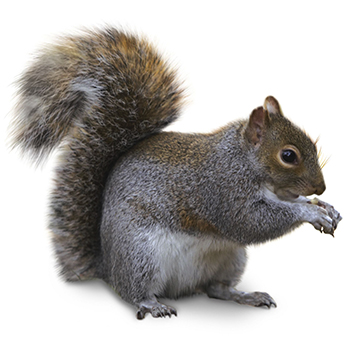Professional Squirrel Trapping and Exclusion

Viking Pest Control does not offer Carcass & Dead Animal Removal. Animal removal is only completed by our team when an animal is found in a wildlife trap. Please contact your municipal office for local animal removal vendors.
Viking Pest does NOT treat, trap, nor exterminate Chipmunks due to local regulations. For more information, please call Viking at 1-800-618-2847
If you have a home or business in New Jersey, Pennsylvania, Maryland, or Delaware, protecting your property from pests is an important part of taking care of your property. Some pests can be harmful to your property and cost you money, while others can pose a threat to you, your family, or your customers. Squirrels can be a problem in buildings due to nesting and reproducing in vents, attics, and other small spaces, and they’re known to carry diseases that can harm people. Squirrels are pests and If not addressed, these furry creatures can become a real nuisance. To protect your home or business from squirrels, you need to learn about the behavior of this pest, take steps for prevention, and find effective treatment options should an infestation occur.
What Are Squirrels?
Squirrels are quick, small, bushy-tailed rodents found almost anywhere throughout New Jersey, Pennsylvania, Maryland, and Delaware. Squirrels are in the same family as prairie dogs, chipmunks, and marmots, and they can look similar. Pest control experts explain although there are more than 200 species of squirrels, they all fit into one of three categories: tree squirrels, ground squirrels, and flying squirrels. Squirrels are indigenous to the Americas, Europe, Asia, and Africa. Squirrels range in size from 3 to 36 inches long, but in North America, the most common squirrels are 15 to 20 inches long, weighing about a pound. Squirrels eat mostly seeds and nuts, but sometimes they’re attracted to fruits and vegetables and even occasionally eat insects or small vertebrates.
How Do I Identify Squirrels?
All squirrels have long bodies covered in short, thick fur and four legs. Their hind legs are longer than their front legs, and they can sit up or scurry around on all fours. You may see them running around on the ground, eating with their front feet, or climbing trees. Pest control experts explain the most common squirrels in the New Jersey, Pennsylvania, Maryland, and Delaware areas are gray squirrels, which you can identify by their white underbelly and whitish to gray fur. These are medium-sized squirrels, similar in size to fox squirrels. Fox squirrels, which are slightly rarer than gray squirrels, have more yellow underbellies and may appear striped with gray and pale gray. Pine squirrels may have more reddish fur on top.
How Do I Get Squirrels?
Squirrels in North America are well adapted to human beings, so they’re common in urban as well as rural areas. Exterminators explain that food and shelter attract these pests, so they may come into your home or business through small openings that allow them to nest and make a new home. These critters are also attracted to food that falls from trees, such as fruit and nuts. Since they’re not afraid of humans, many squirrels come right up to you and beg for something to eat. Feeding them is not wise, as they’ll return again and again if they know they can get food from you.
What Are the Effects of Squirrels in and Around My Home or Business?
Squirrels are pests and can make a home in your place of business or house, wreaking havoc by chewing on woodwork, ceiling panels, electrical wires, and insulation. Squirrels may also do damage to the exterior of your house or building in New Jersey, Pennsylvania, Maryland, or Delaware when they chew their way in. These furry pests can also contaminate water supplies with feces and urine, leave uneaten food to rot, and introduce diseases to your property that can harm humans. If they chew on electrical wires and strip them, they could even cause a fire. Not only that but they can get trapped in small spaces in walls or in your attic and perish, creating a foul stench that can permeate your house or business. The best way to get rid of squirrels and protect your home or business from these unfortunate circumstances is to seek the help and recommendations of pest control experts.
How Long Do Squirrels Live?
In captivity, some squirrels can live anywhere from 18 to 24 years. However, in the wild in New Jersey, Pennsylvania, Maryland, and Delaware, squirrels are known to live anywhere from 6 to 10 years, depending on the species. Females generally live longer, up to 13 years or so. Females can bear young after their first year, and they typically have two litters per year, one in spring and one at the end of summer. Each litter can have an average of two to five “kittens,” so a squirrel infestation can grow pretty quickly in your home or business if you don’t address the issues and work to get rid of squirrels with the professional assistance of a pest control expert.
How Do I Prevent Squirrels?
Preventing squirrels from invading your home or business in the first place is the biggest key to protecting yourself and your property. Exterminators recommend you never feed squirrels that show up in your yard or around your business. Be sure to rake up fallen fruits, nuts, or other food that could attract them, and keep garbage cans tightly closed. You can scare them away if you have a dog or a cat that likes to chase them. If you don’t have pets, a few well-placed plastic statues could spook them and keep them from returning. Squirrels don’t like certain kinds of flowers like daffodils, snowdrops, allium, and hyacinth. Planting these flowers might deter them, and if that’s not enough, you can make squirrel baffles to go around trees or put netting around plants. To keep them out of your building or house, look for openings, cracks, or weaknesses that they could squeeze through or chew on to gain access. Pest control experts recommend checking the roof and eaves and make sure to repair any holes quickly so they can’t get in.
Frequently Asked Questions About Squirrels
Squirrels are foragers and eat just about anything they can find. While they seek out fruits, seeds and nuts, they’re also happy to devour fungi, roots, leaves, and plant stalks. When available, they’ll hunt small insects, invertebrates and even bird eggs. They may also dig through human leftovers in trash cans.
Most squirrels live somewhere between 5 and 10 years in the wild, though they have been known to live upwards of 15.
Yes, squirrels are considered rodents.
Yes, squirrels can get rabies, but it’s not common. This species isn’t considered high risk, with an estimated likelihood of a squirrel contracting rabies at less than 1 in 100,000.
Squirrels see bird feeders as all-you-can-eat buffets filled with some of their favorite foods. To keep them out, try:
•Adding squirrel baffles above and below your feeders so they can’t reach the food.
•Mount your feeders on metal poles at least 10 feet from trees and other structures.
•Use feeders with seed trays to catch fallen seeds.
•Choose seeds squirrels don’t care for, like safflower seeds. Alternatively, add pepper to the feed. Birds don’t mind the addition, but squirrels hate it.
Squirrels will happily set up nests in your attic if given the chance. Once they’re there, it can be difficult to get rid of them, but you can try:
•Installing one-way doors (exclusion doors) that let them leave the attic, but don’t allow them to return.
•Making your attic uncomfortable with bright lights and ultrasonic devices.
•Using live traps and releasing the squirrels far from your property.
•Trimming trees so they don’t provide access to your roof.
•Working with a professional pest control company.
Keeping squirrels away from your property can be difficult, but by utilizing strong scents and removing attractants, you can often encourage them to set up shop elsewhere. Implement these strategies to dissuade them from living in your yard:
•Keep your yard free from food sources like fallen fruits.
•Secure trash cans and clean them occasionally to keep food odors down.
•Trim your vegetation that allows squirrels to climb around your roof.
•If you have a serious squirrel problem, have a pest control company help.















